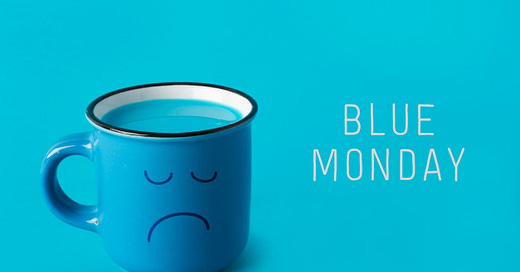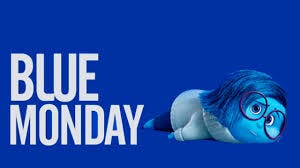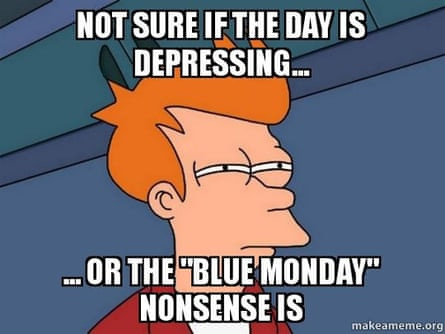Hello!
Lately I’ve been thinking about media literacy – and the need for more of it.
Too often we are fed a clickbait headline or article that intends to provoke or divide us, and we don’t do enough digging to find out the truth.
It’s like when an article credits an idea to “research”, but fails to provide more detail.
It’s the lack of media literacy — and curiosity — that can get us into trouble.
Then I saw the headline last week that said “Blue Monday” was coming.
My first association with “Blue Monday” is the band New Order, but this article was not talking about 1980s music.
It was about the concept of “Blue Monday” – aka “The Most Depressing Day of the Year.”
And given that this “Blue Monday” falls on the third Monday of January, it means we’re just a few days away from it.
But what’s the story behind “Blue Monday”?
I was curious…
The idea of “Blue Monday” goes back to 2005.
That’s when news stories began to appear claiming that a UK psychologist had identified the most depressing day of the year.
News reports claimed the psychologist — Cliff Arnall from Wales — had done this by considering seven variables: (W) weather, (D) debt, (d) monthly salary, (T) time since Christmas, (Q) time since you gave up on your New Year’s resolution, (M) low motivational levels and (NA) the need to take action.
Then he put these variables together into a formula:
I’m not a psychologist, but I immediately wondered how one can measure and compare these variables.
While January may conjure images of harsh winter for some people, what about people in the Southern Hemisphere?
But according to Arnall (and the press articles from 2005), January 24th was the worst day of that particular year.
“Following the initial thrill of New Year’s celebrations and changing over a new leaf, reality starts to sink in,” Arnall told NBC News.
“The realization coincides with the dark clouds rolling in and the obligation to pay off Christmas credit card bills.”
But Arnall’s “research” was not done as part of a medical study.
It was done as part of a PR campaign for a travel company.
“I was originally asked to come up with what I thought was the best day to book a summer holiday but when I started thinking about the motives for booking a holiday, reflecting on what thousands had told me during stress management or happiness workshops, there were these factors that pointed to the third Monday in January as being particularly depressing,” Arnall told The Telegraph in 2010.
Arnall was paid £1200 for his “findings” – and his formula was shared as a press release from PR company Porter Novelli, on behalf of Sky Travel.
“People feel bleak when they have nothing planned,” a spokesperson from Sky said in 2005, “but once they book a holiday they have a goal, they work toward having time off and a relaxing period.”1
Despite the lack of scientific rigor, the idea of a “most depressing day” caught on – and Blue Monday was born.
While press articles referred to Arnall as a “Cardiff psychologist”, Cardiff University sought to distance itself from him — and his “research.”
Many assumed that Arnall was a professor at the university, when he was actually a “part-time tutor” at a further education centre attached to Cardiff University, and, as the university noted in 2006, had “left in February.”
Other psychologists and professors – like neuroscientist Dr. Dean Burnett – were also critical of Arnall’s formula, and called the idea of Blue Monday “nonsense.”
“Firstly, the equation wasn’t the result of some psychological study by a reputable lab, but conducted by a travel company, who then fished around for a psychologist to put his name to it, to make it seem credible,” said Dr. Burnett, who was a psychiatry tutor and lecturer at the Cardiff University Centre for Medical Education.
“It combines things that have no quantifiable way of being combined.”
“It is complete corporate-sponsored gibberish,” Burnett said.
But Arnall and “Blue Monday” still got attention.
As the press came calling, Arnall answered, even referring to himself as a “media slut” on his website.
After identifying the most miserable day of the year, he later declared a day in mid-June was the “happiest day of the year.”
That “research” was sponsored by Walls ice cream.
Ben Goldacre, a vocal critic of Blue Monday and Arnall suggested that instead of a “media slut”, Arnall was really a “corporate whore.”
And Goldacre supported his claim with a formula:
(Media Slut – Ideas) + Money = Corporate Whore
In December 2006, Goldacre said he received an email from Arnall that said:
“Further to your mentioning my name in conjunction with ‘Walls’ I just received a cheque from them.
“Cheers and season’s greetings, Cliff Arnall.”
And as the years went on, the concept of Blue Monday (and Cliff Arnall) were still receiving attention.
By 2010, Arnall was describing himself as a “freelance happiness guru” and telling The Telegraph that people should “refute the whole notion of there being a most depressing day.”
But six years later, he was back to basics – taking money from companies using “Blue Monday” to sell holidays.
In 2016, he partnered with the Canary Islands’ Tourist Board on their #StopBlueMonday campaign.
Arnall visited the islands and posed on the beach to promote the campaign.
“It’s impossible to feel depressed with so many bright, sunny days, brimming with the energy transmitted by the island’s volcanoes and its revitalising natural environment,” he said.
Two years later, he was teaming up with Virgin Atlantic and Virgin Holidays to “encourage customers to forget the ‘Blue Monday’ mentality and book their next adventure.”
But while travel companies make light of the idea of “Blue Monday”, mental health charities have spoken out about the risks of buying into the concept.

“Blue Monday is a PR stunt that was originally dreamed up to sell holidays,” the UK’s Mental Health Foundation posted on their website in 2021.
“It is a myth, a false calculation based on things like the gloomy weather, post-Christmas debt, disappointment from not keeping New Year’s resolutions, dissatisfaction about going back to work and general doom and gloom.
“Since then, it has become a rather tedious yearly PR event, often designed to promote things that are vaguely linked to improving our well-being, more often than not with a complete lack of evidence.
“No actual scientific studies have ever backed up any claims about Blue Monday.”
It’s a sentiment echoed by UK mental health charity Mind:
“There is no credible evidence behind the concept of a most depressing day of the year,” said Mind’s head of information, Stephen Buckley.
“The incentive behind developing Blue Monday was to try to sell holidays abroad, rather than an attempt to promote wellbeing or tackle the stigma surrounding mental health.”
But despite these concerns, the concept of “Blue Monday” lives on.
And it’s a concept that Arnall — the self-professed “Bohemian psychologist”2 – is still pushing today.
On his website, I learned that he now offers life coaching, which he calls “the perfect antidote to Blue Monday — 20 Jan 2025.”
One more thing…
While I do not buy-in to the concept of a “most depressing day of the year”, it is interesting that one event happening in Washington D.C. on January 20, 2025 might have a lot of people feeling down…
And here’s one more…
If you’re curious, here’s a deep dive I did on the New Order song Blue Monday for Curious Minds in 2023…
Who Got Coal from Santa?
Each year people share lists of the best books, films, and albums.
I love those lists.
But no one was writing a list of the best (and worst) communication moments.
So I started doing it!
It’s one of my favorite things to write each year — and in case you missed it, here’s my list of the communicators who made it to Santa’s Naughty List and who received coal in their stockings…
And here are my 10 people whose communication skills earned them a spot on Santa’s Nice List…
How Can I Help?
I’ll keep saying it: Communication matters.
Poor communication costs you — money, relationships and your reputation.
And if you want to improve your communication (and get all the good things that come with that), I’m your gal.
So many companies could reap significant benefits – from performance and culture to retention and engagement – by improving their communication.
So, if you know someone who could benefit from some help (as even the most seasoned leaders do), please get in touch and check out my website for more information.
You can also see my Top 10 list of what I can (and can’t) do for you here.
And if you see any communication examples (the good, the bad, and the ugly) that you think are worth analyzing or sharing, please send them my way!
Until next time, Stay Curious!
-Beth
Once that holiday is planned, misery and sadness take a vacation!
This is how he describes himself on his LinkedIn profile






















I had never heard of Blue Monday, but still found this fascinating!